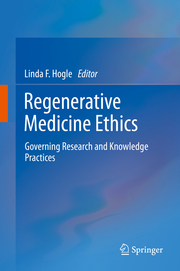-
Zusatztext
-
This book puts the ethics, policy and politics of stem cells into context in a way that helps readers understand why past and current issues have developed the way they have and what the implications are for their work going forward. It also addresses emerging issues as the field progresses towards clinical and industrial uses. While there is a superabundance of material on the ethics of embryo use and questions of embryonic "personhood," there is little that covers what practicing scientists and managers need to know in order to plan and execute responsible research. Furthermore, researchers funded by the NIH are required to have ethics training as a condition of the grant. As such, this book is an essential resource to all of these pre-professional students whether they plan to move into industry, government or academia.
-
-
Kurztext
-
Regenerative medicine is at a pivotal point. Innovations in the science and the rapid growth of translational medicine are transforming the field just as institutional arrangements are changing, making this an exciting yet unsettled time. Recent court cases and policy initiatives are creating crosscurrents that keep older issues from being settled while introducing new dilemmas. Current research propels collaborations across disciplines and sectors, raising the question of how tensions between the protection of intellectual property and the movement toward 'open science' can be negotiated. Other important social, ethical and legal questions arise in the gray areas created by new scientific techniques and pragmatic areas involved in scale-up and testing in humans. The times call for governance that is adaptive to meet the needs of science yet able to maintain public trust. The contributors address these and other vital questions through chapters focusing on topics such as data sharing; patenting of human biological material; and managing collaborations across academic, industry and government sectors as well as across national boundaries. Key research ethics issues are also included such as obtaining consent from biospecimen donors; accessing biorepository data, and considerations in designing preclinical and clinical trial protocols for first-in-human research, including upcoming policy changes. Rather than retracing well-trodden topics, the book points to nascent areas that need to be addressed. Whether working in academia, industry, or government, regenerative medicine scientists and managers need to know how to navigate current and upcoming issues of governance facing the field. Regenerative Medicine Ethics: Governing Research and Knowledge Practices will be a valuable resource for scientists, policy-makers and students as they plan and execute responsible research. About the Editor Linda F. Hogle is Professor of Medical Social Sciences in the School of Medicine & Public Health at the University of Wisconsin-Madison and Fellow at the Wisconsin Institutes for Discovery. Her research includes analyses of social, ethical, and legal issues in emerging cell-based and biomedical engineering technologies, as well as concepts of risk in innovative science as understood by governance bodies. She has served as an advisor to several international research consortia focusing on stem cell and regenerative medicine.
-
-
Autorenportrait
- Linda F. Hogle is Professor of Medical Social Sciences in the School of Medicine & Public Health at the University of Wisconsin-Madison and Fellow at the Wisconsin Institutes for Discovery. Her research includes analyses of social, ethical, and legal issues in emerging cell-based and biomedical engineering technologies, as well as concepts of risk in innovative science as understood by governance bodies. She has served as an advisor to several international research consortia focusing on stem cell and regenerative medicine. Contributors include:Sean P. Palecek, University of Wisconsin-Madison, Department of Chemical and Biological Engineering, WIDavid Schaffer, University of California-Berkeley, Department of Chemical and Biomolecular Engineering, CAPeter W. Zandstra, University of Toronto, Institute of Biomaterials and Biomedical Engineering, ON, Canada David B. Resnik, National Institute of Environmental Health Sciences, NCTania Bubela, University of Alberta, Department of Public Health Sciences, AB, CanadaAmrita Mishra, University of Alberta, Department of Public Health Sciences, AB, CanadaDebra J. H. Mathews, The Johns Hopkins University, Berman Institute of Bioethics, MDKevin E. Noonan, McDonnell Boehnen Hulbert & Berghoff LLP, ILPilar N. Ossorio, University of Wisconsin-Madison Law School, WIJessica von Reyn, University of Wisconsin-Madison Law School, WINancy M. P. King, Wake Forest University School of Medicine, Department of Social Sciences and Health Policy, NCAmritava Das, University of Wisconsin-Madison, Department of Chemical and Biological Engineering, WI
Detailansicht
Regenerative Medicine Ethics
Governing Research and Knowledge Practices
ISBN/EAN: 9781461490616
Umbreit-Nr.: 5499172
Sprache:
Englisch
Umfang: viii, 227 S., 2 farbige Illustr., 227 p. 2 illus.
Format in cm:
Einband:
gebundenes Buch
Erschienen am 05.12.2013
Auflage: 1/2013


